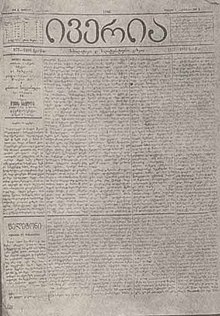Ilia Chavchavadze
Prince Ilia Tschawtschawadze ( Georgian ილია ჭავჭავაძე ; born October 27, 1837 in Kvareli , Georgia Governorate , Russian Empire ; † August 30, 1907 in Zizamuri near Mtskheta ) was a Georgian poet, dramaturge and journalist. He was one of the leading figures in the Georgian national movement.
Life
He was the son of Prince Grigol Chavchavadze and Mariam Beburishvili. The family was impoverished. His mother died when he was ten years old and his father five years later. He grew up with his aunt Makrine Chavchavadze-Eristawi. In 1857 he passed the Abitur at the 1st Classical Gymnasium in Tbilisi . To 1861 he studied law at the University of St. Petersburg , was for participating in democratic student protests relegated .
Back in Georgia, he divided his inherited property among the serfs , and in 1868 became justice of the peace in Dusheti. In 1873 he moved to Tbilisi. From 1874 until his death he was director of the Adelsbank in Tbilisi.
In 1863, Chavchavadze founded the political magazine Sakartvelos Moambe and became its editor-in-chief. In 1877 he founded and directed a new magazine: Iweria . It later became a daily newspaper under his leadership. In 1906 he was elected to the Russian State Duma , where he campaigned for the abolition of the death penalty .
Chavchavadze founded the realistic moral novel in Georgia, wrote short stories and poems, including The Hermit , Is Man Human? (1859), mother and son (1860), Kako the robber (1860) and Otar's widow (1887). He also translated English-language literature into Georgian. Many of his works have been published in French, English, German, Russian, Polish and Ukrainian.
Together with Akaki Tsereteli , Chavchavadze was a member of the liberal and social reformist writers' association Tergdaleuni . He was one of the founders of many cultural and educational institutions in Georgia. These included the Society for the Dissemination of Literacy among the Georgians , the Bank of the Nobility , the Drama Society , and the Historical-Ethnographic Society of Georgia .
In 1907, Chavchavadze was murdered by six bandits on a trip to the Zizamuri Gorge. It is now considered certain that it was a political assassination attempt. It is controversial whether Georgian communists, whose political concept Chavchavadze had attacked shortly before his death, or the tsarist secret police Okhrana were behind it . He was buried with great public sympathy on what is now the Pantheon on Mtatsminda in Tbilisi. His grave slab is adorned with a relief from Auguste Rodin's workshop .
Chavchavadze was married to Olga Guramishvili (1842–1927) since 1863.
Awards
In July 1987 he was canonized by the Georgian Orthodox Apostle Church and was given the honorary name Ilia the Righteous . The National Library of the Georgian Parliament and the Ilia State University in Tbilisi bear his name. His portrait is depicted on the front of the Georgian 20 lari banknote.
Works

- Ilia Tschawtschawadze: The exchanged bride. Narration . LKG, Leipzig 1995, ISBN 3-376-05020-1 .
- Ilia Tschawtschawadze: leqsebi - poems . Merani, Tbilisi 1987
- Arthur Leist (ed.): Georgian poets . Dresden / Leipzig 1887 (poems by Ilja Tschawtschawadze and other Georgian poets)
- Ilia Chavchavadze: The Hermit . translated from the Georgian by Marjory Wardrop. London 1895
literature
- Akaki Bakradse: Ilia Tschawtschawadze (1837-1907). A picture of his life and a selection of his poems . Evangelical Office of Oekumene Switzerland, Bern 1993.
- Leonhard Kossuth: Ilia Tschawtschawadze - our contemporary . In: Georgica . Vol. 17, 1994, pp. 130-134
- Oliver Wardrop: The Kingdom of Georgia . London 1888, pp. 150-152
- Carl Friedrich Lehmann-Haupt : Travel and Research . Berlin 1910, pp. 106-111
- Oliver Reisner: The Tergdaleulebi: Founders of Georgian National Identity . In: Ladislaus Löb, István Petrovics, György E. Szonyi (eds.): Forms of Identity: Definitions and Changes . Attila Jozsef University, Szeged 1994, pp. 125-37
- Oliver Reisner: The School of the Georgian Nation: A socio-historical investigation of the national movement in Georgia using the example of the "Society for the Spread of Literacy Among the Georgians" (1850-1917) . Reichert, Wiesbaden 2004, ISBN 3-89500-412-X
Web links
- Literature by and about Ilia Tschawtschawadze in the catalog of the German National Library
| personal data | |
|---|---|
| SURNAME | Chavchavadze, Ilia |
| ALTERNATIVE NAMES | Chavchavadze, Ilya Grigoryevich (full name); ილია ჭავჭავაძე (Georgian); Чавчавадзе, Илья Григорьевич (Russian); Čavčavaje, Ilja Grigorjevič |
| BRIEF DESCRIPTION | Georgian prince, writer and politician |
| DATE OF BIRTH | October 27, 1837 |
| PLACE OF BIRTH | Kvareli , Georgia |
| DATE OF DEATH | August 30, 1907 |
| Place of death | Zizamuri at Mtskheta |

